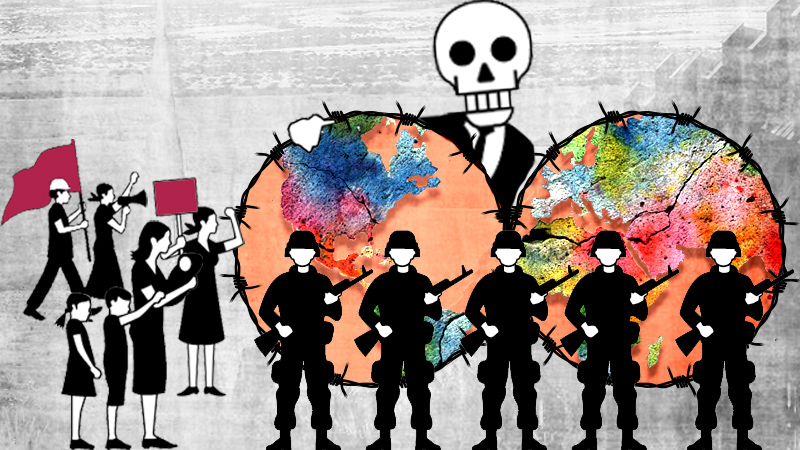“Down with the Damocles sword of deportation! This is the first condition for foreigners to stop being predestined to squeeze wages and break strikes.”
— Karl Liebknecht
For the past several weeks, politicians on both sides of the aisle have been scrambling to respond to the mass mobilization of thousands of Central American immigrants who have been marching toward the U.S.-Mexico border looking for refuge from violence and poverty in their home countries. President Donald Trump, in a typical show of exaggerated force, has sent more than 5,000 troops to the border to defend against the “threat” of these migrants, and just this week border police fired canisters of tear gas at women and children. Meanwhile, the Democratic Party, under the leadership of Nancy Pelosi, sensing perhaps that Trump might energize his base for the midterm elections by pandering to nationalist xenophobia aroused by the caravan, has largely ignored the phenomenon, turning a blind eye to the suffering of these migrants to focus public attention instead on the supposedly more pressing and urgent questions of health care and other domestic issues.
In contrast to the xenophobia and cruel indifference of the political establishment, working people and unionists as well as large sections of the U.S. left have responded with calls to support the migrant caravan, to “open the border” and to “let them all in!” This unprecedented show of support has often been accompanied by an uncompromising criticism of the very concept of militarized national borders and an assertion of the fundamental right of all people to migrate freely from one state to another. But not everyone on the so-called left agrees, and just last week, as if on cue, author Angela Nagle, author of “Kill All Normies,” tossed what amounts to a live grenade into the immigration debate. Her article, “The Left Case Against Open Borders,” published in the right-wing, pro-Trump American Affairs journal, argues that “open borders” have always been a demand of big capital. She argues that the left’s calls to open the border are based on abstract “morality”—a good and noble principle perhaps, but one that, she affirms, is misguided. She claims further that closed borders are good for working people. “There is no getting around the fact that the power of unions relies by definition on their ability to restrict and withdraw the supply of labor,” she writes, “which becomes impossible if an entire workforce can be easily and cheaply replaced. Open borders and mass immigration are a victory for the bosses.” In place of open borders, she proposes defending migrants against abuses and supporting what she calls a “national Left in the small and developing nations—acting in concert with a Left committed to ending financialization and global labor exploitation in the larger economies.”
Although Nagle seems to be speaking in the interests of working people, she is dead wrong about open borders: they do not benefit capitalism and they do not hurt the working class. Unfortunately, she is not the only person on the broad left to make this argument; Bernie Sanders has made similar statements, famously telling Ezra Klein he thinks open borders are “a Koch Brothers proposal.” In response to these many willful misreadings and fabrications, it is worth reaffirming that socialists support and have always supported open borders, not out of any moral imperative (though such an imperative surely exists), but as a way of uniting the working class in the struggle against imperialism.
Place Imperialism at the Center
While Nagle ‘s article examines in some detail the relationship between immigration and neoliberal economic policies such as the North American Free Trade Agreement (NAFTA), which devastated the Mexican economy, the conclusions she draws are warped by her own liberal economic analysis, which sees immigrants as individual agents seeking to maximize their wages, and immigration more broadly as a zero-sum game in which workers compete against each other and states either win or lose. The fact is most migrants would prefer to stay home if they could, and the vast majority are fleeing circumstances directly created by the profit-seeking efforts of global imperialist policy—consequences which do not simply go away when borders are closed, or when they are opened for that matter. Capital, aided by these imperialist policies, has almost unlimited freedom of movement; limiting the movement of labor only makes workers captive and vulnerable to further exploitation.
But it is Nagle’s failure to account for the power and persistence of imperialism that most weakens her argument. The massive migration of millions of human beings to the imperialist centers of the globe is one of the most pressing structural problems of the world imperialist system, particularly after the economic crisis of 2008. In Europe, for instance, thousands of migrants have been fleeing countries devastated by imperialist wars. Many of these immigrants have drowned in the Mediterranean, while others still sit in refugee camps, waiting to be sent back to their native countries. In the Americas, the migration flow from Central America and Mexico to the United States is the direct product of U.S. economic and military intervention across both continents. Indeed, Mexico and Central America are wholly subordinated to their northern neighbor in economic, political and security matters. The trade liberalization and free trade agreements of the 1990s have had devastating consequences on the peoples of these regions, leading to political corruption, mass violence, femicide, and gang wars, not to mention general levels of poverty and extreme poverty, which have been rising for years. Meanwhile, the working classes of these states, particularly the youngest, have been forced to subsist on meager wages to satisfy the hunger for profits driven by the transnational corporations. The alternative which many turn to is to join the maras—or organized drug cartels.
You might be interested in: [Abolish ICE, and Abolish the Border Too: A Socialist Perspective
->https://www.leftvoice.org/Abolish-ICE-and-Abolish-the-Border-Too-A-Socialist-Perspective]
Over the last three decades the so-called war on drugs was imposed on Mexico and Central America as a way to discipline Latin American drug cartels, which overwhelmingly provide drugs to U.S.-based users. This war has created a bloody conflict based on the militarization of the region, at the hands of the local armies monitored, trained and armed by the United States. These local armies are, in turn, the partners of organized crime, profiting immensely from the relationship. Although U.S. intelligence agencies claim to “fight the narcos,” in reality the United States makes deals with the very narcos they claim to fight—evident in the Contra cocaine trafficking schemes of the 1980s. U.S. arms corporations have made billions off of this war, flooding the region with guns. Caught in the crossfire of this drug war are the poor and working class. To omit that migration today is connected to the brutal circumstances of imperialist oppression is to omit the fact that the fight for the rights of migrants is an anti-imperialist battle.
At the same time that the left must fight imperialist policies in the military and economic terrain, decades of imperialism and a legacy of colonialism make immigration a certainty. It is entirely utopian to believe that the United States would have any interest in improving the living conditions or raising the wages of workers in South and Central America to the point that immigration would no longer occur. Restrictive immigration laws will not stop immigration; they will merely make it more dangerous. Likewise, such laws will not end capital’s exploitation of immigrant labor but only make them that much more precarious and exploitable.
Capitalists Profit From Borders
Free, unrestricted competition in the labor market is central to capitalist profit. The drive to push down wages through competition between workers is a mechanism inscribed in the logic of capital, as Marx showed. It is therefore absurd that Nagle quotes Marx in her “left” argument against open borders, since Marx makes precisely the opposite argument. As Nagle quotes him, “This antagonism [between the native and foreign working class] is artificially kept alive and intensified by the press, the pulpit, the comic papers, in short, by all the means at the disposal of the ruling classes. This antagonism is the secret of the impotence of the English working class, despite its organization. It is the secret by which the capitalist class maintains its power.”
In other words, as Marx and socialists after him have argued, borders are essential to capitalist control. Marx goes on to argue for the struggle against English intervention in Ireland, support for the Irish working class and for “a coalition of the German workers with the Irish workers.” The socialist response to this has always been the unity of the working class across national boundaries.
Neoliberalism was very effective in perfecting this objective by relaxing labor laws, a process of de-unionizing workers and increasing divisions in the labor force between those who are unionized and those who are not, those who are documented and those who are not, those who are subcontracted and those with contracts. In particular, the neoliberal era and its free trade agreements dispossessed millions of indigenous people of their lands and created a new Latin American proletariat. It made it immensely profitable for factories to move to semicolonial countries, where what were once good union jobs in the U.S. became maquilas and hyper-exploited low-wage labor in the Global South.
The global economic crisis of 2008 left millions of new unemployed people in its wake. This situation lowered wages for the entire working class, as capitalists used these divisions in the labor force to extract more surplus value from undocumented and precarious workers while increasing cuts to unionized and higher wages workers.
You might be interested in: [Why Socialists Have Always Fought for Open Borders
->https://www.leftvoice.org/Why-Socialists-Have-Always-Fought-for-Open-Borders]
The workers who migrate from their countries of origin to the imperialist metropolises are integrated into the labor market as second-class citizens: without rights, without benefits, without anything. This allows employers, on the one hand, to access cheap labor, and it makes organizing the workers exceedingly difficult and dangerous. On the other hand, this cheap labor force without rights lowers wages of the native working class.
It is not true then that the capitalist class wants open borders. The anti-immigrant laws put forward by imperialist bourgeoisies are in the service of increasing this division and thereby increasing their profits. This is why the right wing of the capitalist ruling class deploys a profoundly racist discourse aimed at holding “illegal” (or undocumented) workers responsible for the effects of the economic crisis and the unemployment that the working class in their own countries suffers. This is also why Hillary Clinton proposes harsher immigration laws as a response to this right wing and why Barack Obama is known as the “deporter in chief.”
In this sense, Nagle steals arguments from Donald Trump’s election campaign, seeing it as a given that migrants increase the precariousness of labor. But it is not the flow of migrant workers in itself that lowers wages or creates unemployment for the native working class. It is precisely the restrictions on mobility that allow the employers to have a cheap labor force without citizenship rights. It is precisely the “illegal” status that lowers wages, not the necessary effect of migration. Nagle’s argument that the left should support the restriction of working-class mobility implicitly supports the mechanism by which these workers are forced to live as second-class citizens, guaranteeing capitalist profits in a moment of economic crisis.
So what is a socialist response to this situation? Faced with the division of the working ranks between documented and undocumented, employed and unemployed, a left response would be to demand a division of work hours between all workers and the reduction of working hours with no reduction of wages. This is a demand that has been and can be put forward by leftists. Most recently, these two demands were the centerpiece of the electoral campaign by the Left and Workers Front in Argentina in order to eliminate the enormous burdens imposed on the working class in the name of capitalist productivity. They won two seats in Congress, as well as dozens of state and city council seats.
The left and the working class in America must fight for full political, economic and social rights for all undocumented workers who work under very poor conditions in the United States. While this has “moral” implications, the reason to support open borders is in the material interests of the working class and a strategic necessity to confront the right wing. Just as unionized workers help themselves by fighting for the unionization of those who are not organized, by raising the standard of living for the migrant sector of the American proletariat, the working class will be in a better position to impose a program that improves its conditions and builds its power.
Is it utopian to fight for open borders?
Nagle’s position, like that of other reformists who claim to represent the interests of working people, only reaffirms and thus strengthens the logic of capitalist exploitation. Like Sanders, who is also opposed to open borders, her “leftism” doesn’t challenge capitalism or imperialism.
Many Sanders supporters may argue that open borders, while ideal, are unrealistic and utopian. Instead of fighting for open borders, they argue, the left should focus their energies on more “realistic goals” such as ousting Trump in the 2020 elections and electing a more progressive face for the U.S. empire.
There are various problems with this strategy. No Democratic administration has stopped the criminalization, deportation and hyper-exploitation of the United States’ undocumented working class. In fact, some, like the Obama administration, deported more than Trump and also pepper-sprayed and tear-gassed people at the border. Neither Reagan nor Bush was for open borders, as Nagle absurdly claims. Reagan for example, provided amnesty for some undocumented immigrants while at the same time increasing funds for border “security”.
You might be interested in: Democrats Were Not “the Lesser Evil” for the Migrant Caravan
The capitalists are not going to open the borders out of the goodness of their hearts. And the reason for this is not because it is impossible, or because they fear the country will be flooded with criminals, or because they do not have the resources to receive an influx of new residents. They are not going to open the borders because borders are an efficient mechanism to extract massive amounts of surplus value from the native and migrant working classes. They are not going to open the borders because they don’t want to be forced to deal with the consequences of the brutal imperialist policies the U.S. perpetrates around the world.
And yet, open borders is the only demand that can unite the U.S. working class, both documented and undocumented. It is the only demand that can unite the U.S. working class with their working-class brothers and sisters around the world. And it is a demand that in the hands of the working class can serve as a transitional demand that deeply questions the capitalist state.
And open borders is not at all an abstract question. There are thousands at the border right now. We cannot wait until 2020.
Defending the free movement of the caravan and the immediate demilitarization of the southern border is an elementary measure that should unite the left. In the elementary framework of solidarity with the Migrant Caravan, socialists have an obligation to provide a class perspective to the demand of open borders. We have the responsibility to understand the Caravan as part of the class struggle and both an opportunity and a necessity for our intervention to turn solidarity into struggle and organization. Right now, thousands of Central American brothers and sisters are at the gates of the United States. They will not wait until 2020. The calendar of the class struggle is not the calendar of those above who speak of the workers only during electoral campaigns. The presence of the Caravan on the border is an invitation to action. It depends on the socialist left to develop the class struggle, to radicalize it and to direct it toward an increasingly profound questioning of capitalism in general and of imperialism in particular.












